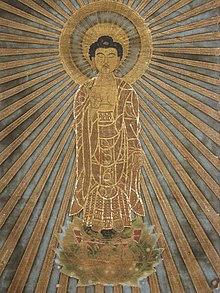
Other power (Chinese: tālì 他力, Japanese: tariki, Sanskrit: *para-bala) is an East Asian Mahayana Buddhist concept which is discussed in Pure Land Buddhism and other forms of East Asian Buddhism. It generally refers to the power of a Buddha which can inspire someone, and take them to the Pure Land where they may easily become a Buddha. Other power is often contrasted with "self power" or jiriki (自力, one's own strength[1]), that is, attempting to achieve enlightenment through one's own efforts.[2][3] According to Mark L. Blum, other power can be described as "something 'received' or 'influenced' from the sacred world beyond the self".[4] Other power is also commonly called "Buddha-power" or "vow power" (願力, Skt. praṇidhāna-vaśa), the latter referring to a Buddha's past bodhisattva vows (purvapraṇidhāna) which have a certain power to influence sentient beings.[5][4]
While the term "other power" was coined in Chinese sources, Indian Mahayana literature contains numerous similar ideas that relate to the Buddha's power to influence living beings, such as anubhāva (influence or inspiration provided by the Buddha) and adhiṣṭhāna (the sustaining power of the Buddha). These ideas can be understood as the Buddha's "supernatural power," "grace," "empowerment," "divine blessings," and "divine protection".[6]
Pure Land Buddhism considers itself the "easy path" because it relies on other power, while other Buddhist paths are seen as self power paths, also called "the path of sages".[7] While all Mahayana Buddhists agree that the Buddha's power has some effect on Buddhist practitioners, different Mahayana traditions have different accounts of how the other power of the Buddha works and how one's own practice interacts with it. Some Pure Land Buddhists hold that we must abandon all "self power" practices (such as ascetic practices, repentance, various kinds of meditation) and all self effort, and rely only on Amitabha Buddha's other power. Others hold that one's own "self power" becomes linked with the power of the Buddha through "sympathetic resonance" (gǎnyìng 感應). This view of the cooperation of self power and other power is more common in Chinese Pure Land thought.[8]
Tibetan Buddhism also affirms that there are multiple causes to rebirth in a Pure Land, and that both the Buddha's power and the power of one's own karmic force are contributing causes.[9]
- ^ Kenkyusha's New Japanese-English Dictionary, Kenkyusha Limited, ISBN 4-7674-2015-6
- ^ Hiroyuki, Itsuki (2001). Tariki: Embracing Despair, Discovering Peace. New York: Kodansha. p. xvi. ISBN 978-4062099813.
- ^ Takamaro Shigaraki. Heart of the Shin Buddhist Path: A Life of Awakening, pp. 91-84. Simon and Schuster, Mar 26, 2013.
- ^ a b Blum, Mark L. The Origins and Development of Pure Land Buddhism: A Study and Translation of Gyonen's Jodo Homon Genrusho, p. 8. Oxford University Press, Mar 21, 2002
- ^ 本願力 power of the past vow, Digital Dictionary of Buddhism.
- ^ Cite error: The named reference
:12was invoked but never defined (see the help page). - ^ Bloom, Alfred (1964). Shinran's Philosophy of Salvation By Absolute Other Power, Contemporary Religions in Japan 5 (2), 119-142
- ^ Jones, Charles B. (2021). Pure Land: History, Tradition, and Practice, pp. 165-188. Shambhala Publications, ISBN 978-1-61180-890-2.
- ^ Halkias, Georgios T. (2012). Luminous Bliss: A Religious History of Pure Land Literature in Tibet, p. 123. University of Hawaii Press.
